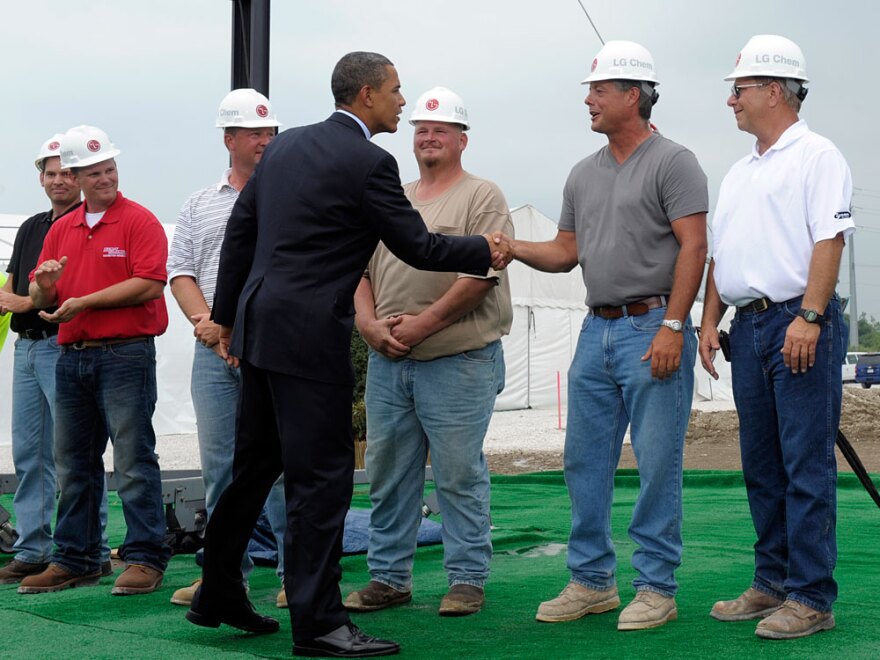As President Obama goes to New Jersey for a meeting with small-business owners Wednesday, Americans' satisfaction with his handling of the economy remains at a low ebb.
In a new Reuters poll, 67 percent of voters said Obama has not focused enough on creating jobs.
Since December, Obama has delivered more than a dozen economic speeches like the one he will give in New Jersey. Yet with his poll numbers dropping steadily, it's far from clear that the campaign is helping the president's cause.
Taking The White House On The Road
White House Deputy Communications Director Jen Psaki says the president benefits from these trips in ways that have nothing to do with his approval rating.
"The goal is really to hear feedback, learn from people who are working, who are running businesses every day, about what's working and what's not working, so we can come back and figure out how to continue the road to recovery," she said in an interview.

Psaki says there are no plans to end the tour, and she's not surprised that the speeches have so far failed to boost his approval ratings.
"We know that the American people have suffered a great deal," Psaki says. "And it's been frustrating for everybody, including the president, because we know that when you're dealing with a crisis of this depth, that recovery's not going to happen overnight."
For any White House, the most precious commodity is the president's time. Sending him outside of Washington, even for a few hours, is a huge commitment.
"Many people have described it as basically taking the White House on the road," says former Secret Service Director Ralph Basham, who is now with Command Consulting Group.
Sending the president away, Basham says, requires mobilizing "the communications, the security, the support, the administration, the military -- that gives the president basically the ability to run the country no matter where he is."
'Road-Testing Themes'
So far this year, Obama has made more than a dozen trips on what the administration refers to as the "White House to Main Street Tour." He generally tours a business that is adding jobs because of the economic Recovery Act. The speech is very similar from one stop to the next.
"We've aimed to grow our economy by harnessing the innovative spirit of the American people," he said two weeks ago at the groundbreaking for an electric car battery plant in Holland, Mich. "Because we did, shovels will soon be moving earth, and trucks will soon be pouring concrete where we are standing."
It is an overt sales pitch that Americans appear not to be buying. And there are those who believe that the president, like yesterday's rock star, has been touring too long.
"Just saying it over and over again is not going to convince anybody that things are really happening," says Ed Rollins, who was political director in the Reagan White House. "If I were running the political operation at this point in time, anytime I'm outside the White House, I'd be campaigning."
There is a campaign element to many of these trips. The speeches tend to be in swing states.
Sometimes Obama does fundraisers for candidates in the same trip as an economic speech. Earlier this month, he paired Recovery Act events with campaign stops for Senate candidates on a two-day trip through Kansas City, Mo., and Las Vegas.
"I think the president and his team have been road-testing themes for the midterm" on this economic tour, says former Democratic consultant Bob Shrum, who now teaches at New York University. "Getting a message through takes a long time, and developing that message can also take some time, so I think this is cumulative."
He says the White House is trying to create a narrative, laying the foundation for when people begin to feel the recovery. That message may take hold when the unemployment rate drops -- assuming the unemployment rate drops.
Copyright 2023 NPR. To see more, visit https://www.npr.org. 9(MDM3NjYwMjA5MDE1MjA1MzQ1NDk1N2ZmZQ004))




